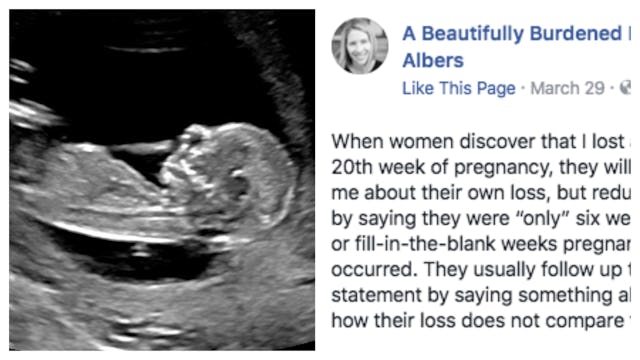Mom's Honest Post About Miscarriage: 'It Doesn't Matter If It Was An Early Loss Or Late Loss'

Her words validate all pregnancy loss, no matter how far along it occurs
When it comes to miscarriage, loss is loss. Whether a mom is a few weeks along or a few months, pregnancy loss is truly heartbreaking. Jenny Albers, the mom and blogger behind A Beautifully Burdened Life, opened up about her own experience with pregnancy loss, and her words will change the way you discuss miscarriage from now on.
She lost a baby during her 20th week of pregnancy. For a pregnant woman, the 20th week represents many things: the first ultrasound where baby is, well, looking like a baby; the big “five months” milestone, etc. To suffer a loss at that stage in pregnancy would be absolutely devastating.
Albers gently reminds us all that any pregnancy loss, no matter how far along, is utterly devastating.
“When women discover that I lost a baby during the 20th week of pregnancy, they will often open up to me about their own loss, but reduce its significance by saying they were ‘only’ six weeks, eight weeks, or fill-in-the-blank weeks pregnant when their loss occurred,” Albers writes. “They usually follow up that ‘only’ statement by saying something along the lines of how their loss does not compare to mine.”
She admits in the past, she’s thought similar things. She’s also experienced pregnancy loss at six weeks as well. “I’ve reduced it to being nothing more than a medical mishap that occurred when I was ‘only’ six weeks pregnant. And when hearing of someone else’s full-term loss, I’ve considered how much worse it might have been to lose my baby at 40 weeks instead of at ‘only’ 20 weeks.”
Albers says this is where the problem lies with how we think of and talk about pregnancy loss. The loss of a baby that was too small to be seen isn’t any less significant, just because it occurred earlier. Because whether it’s an “early” loss or a “late” loss — it’s just that. A heartbreaking loss.
“I don’t know the details of anyone else’s loss, nor can I say I know exactly how they were affected by loss,” she says. “But I do know that there is no “only” in pregnancy loss. Not in mine or anyone else’s. There is ‘already.'”
Because for moms who have suffered a miscarriage, no matter how far along your pregnancy progressed, it was “already” there.
“There was already life as evidenced by two pink lines. The same pink lines that had already alerted a woman to her role as mother. There was already the sound of a heartbeat, whether it beat for a day, a month, or longer. There was already a connection between mother and baby.”
She’s absolutely right. Last fall, I found out I was pregnant on the same day I suffered a miscarriage. I was about six or seven weeks along. I have a history of irregular periods as a result of polycystic ovarian syndrome, so I didn’t take a test until I was bleeding and experiencing such crippling pain that my doctor advised it. It was the most heartbreaking moment of my life thus far, but I have a tendency to lessen it when I talk about it — in exactly the way Albers describes. I was “only” six weeks. I didn’t even know for sure that I was pregnant until the day I found out it wasn’t meant to be. I didn’t spend weeks pinning nursery colors or musing over names. Some women have it much worse, I thought. I tried to minimize the pain and fell into an isolating bout of depression for a few months.
Because it was a loss. A devastating, keenly felt loss.
“It doesn’t matter if a pregnancy ‘only’ lasted for a few weeks,” Albers says. “It doesn’t matter if it was an early loss or a late loss. What matters is that there was already a baby who was loved immensely. And love cannot be measured in weeks.”